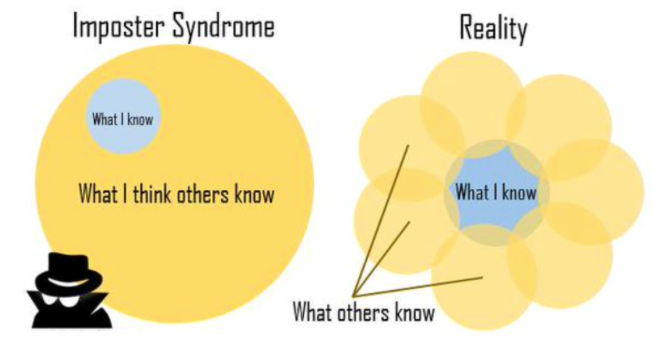Have you ever quit something before it could go wrong? Ended a relationship before you could get hurt? Stirred things up out of boredom? These are all examples of self-sabotage, which can manifest when we don’t feel we deserve good things or when we fatalistically think all good things must come to an end. With Imposter Syndrome, you may experience all of these thoughts and feelings in response to having an internal battle with yourself and have a fear of success! More specifically, when achieving success, your doubt in yourself may show up as a fear of being exposed as a fraud to others.
Image courtesy of caitlinhudon.com
The image above captures the perception that others know more than us, which can lead to self-sabotaging behaviors or crippling self-doubt, resulting in delayed or stunted progress towards your goals and creating unnecessary anxiety in various areas of our lives. So, what can we do about it? How do we embrace our knowledge base, success, and self-worth?
Discovering Strengths
For many of us, it’s a fine balance between self-confidence and ego. Our society has taught the youngest generations to not speak too highly of themselves out of concern of being called cocky, egotistical, entitled, or self-centered. When celebrating strengths, it is important to break down some of these barriers and embrace what we do well. Some ways you can do this include:
- Asking Family and Friends: By engaging in rewarding conversations with those that know you well, you can listen for language that describes your strengths.
- Floating Back: Recalling compliments or positive feedback from others in the past, including work situations, can help pinpoint times when you were recognized for your strengths.
- Take a Test: The popularity of personality tests and other self-assessments continue in helping people find their strengths. Consider the following tests in your self-exploration:
o Myers Briggs Type Indicator (MBTI) – looks at how you interact with others, thinking vs. feeling, and more.
o Enneagram – Explores how you relate to others and what you contribute to relationships when balanced or unbalanced. Check out the free EnneaApp quiz in the App store!
o Big Five Factor Personality Test – explores your openness, agreeableness, neuroticism and more.
o Locus of Control – take the self-assessment to explore how you are internally or externally motivated to do things in your life.
o Values Inventory – explore what is most important to you with a values inventory. A free, online version can be found at http://www.lifevaluesinventory.org
Encouraging Growth
Now that you’ve found your language and skills that demonstrate your strengths, it will be important to continue learning about yourself to silence the Imposter Syndrome’s little, nagging voice that states you are a fraud. Perhaps you challenge yourself to grow through additional schooling or training. Or measure your progress through achievement of short-term goals. Or perhaps you identify a professional who can serve as an accountability partner in your quest for confidence. Such professionals include:
- Coaches
- Consultants
- Therapists
Celebrating Successes
By engaging a trusted professional or other support person who know you well, you can also feel encouraged to slow down and celebrate the little successes in life. Maybe you had a goal to feel more comfortable talking about what you do with others and you celebrate attending a network event where you had to describe it to multiple people in a matter of minutes. Perhaps you have a goal of conquering your fear of public speaking and find yourself in front of a community audience talking about a project you are involved in. Whatever the achievement, slowing down to celebrate it with those you love can reduce the experience of Imposter Syndrome, making is less of a barrier and instead, serving as fuel for your fire of drive and purpose!
“Think about all the crazy ways you feel different from everyone else. And now take the judgment out of that. And what you are left with is such a wholly dynamic, inspiring character who could lead an epic story.”
Jennifer Lee
Khara Croswaite Brindle, MA, LPC, ACS, is a Licensed Professional Counselor in the Lowry Neighborhood of Denver, Colorado. She received her Masters Degree in Counseling Psychology from the University of Denver with a focus on community based mental health. Khara has experience working with at-risk youth and families, including collaboration with detention, probation, and the Department of Human Services. Khara enjoys working with young adults experiencing anxiety, depression, trauma, relational conflict, self-esteem challenges, and life transitions.


